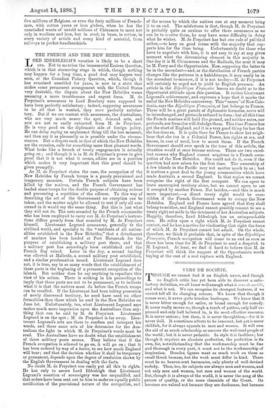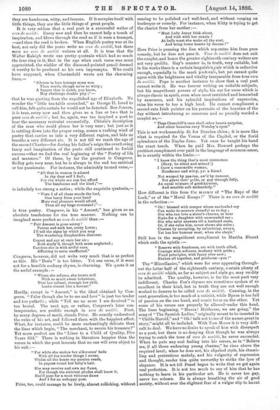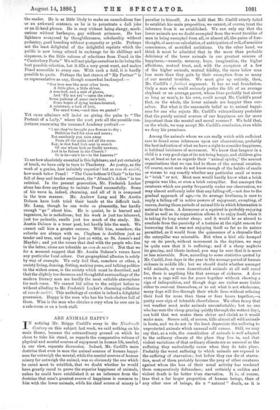VERS DE SOCIETE.
THOUGH we cannot find it an English name, and though no English critic has yet been able to discover a satis- factory definition, we all know well enough what is vers tie soda& and what is not. We can recognise its strongest features, if we cannot tell all its changing colours. We know that though it comes near, it never quite touches burlesque. We know that it is never bitter enough for satire, or broad enough for comedy. It never really moves us, though a touch of pathos, only half ex- pressed and only half believed in, is its most effective resource. It is never serious ; but then, it is never thoughtless,—for it is never dull. It sometimes affects to be innocent, but yet is never childish, for it always appeals to men and women. It will own the aid of as much scholarship as amuses the well-read people of the world ; but it is never pedantic. In style it is faultless ; but though it requires an absolute perfection, the perfection is its own, for, notwithstandiug that the workmanship must be fine and thorough in every part, it must not be the workmanship of inspiration. Dresden figures want as much work on them as small Greek bronzes, bat the work must differ in kind. There must be no heaven-sent harmonies, only plenty of well devised melody. Then, too, its subjects are always men and women, and not only men and women, but men and women of the world. But, though it is always of the world, it is never the song of the person of quality, or the mere chronicle of the Court. Its heroines are valued not because they are duchesses, but because
they are handsome, witty, and famous. If it occupies itself with little things, they are the little things of great people.
It is very-seldom that a real poet is a successful writer of yaps de societe. Every now and then he cannot help a touch of inspiration, and blows through the reed as if it were a trumpet, —and then the reed is broken. When English poetry was at its best, not only did the poets write no vers de societe, but there were no vers de societe writers at all. It is true that Sir Walter Raleigh wrote one pretty quatrain which had so much the true ring in it, that in the age when such verse was most appreciated, the wielder of the diamond-pointed pencil deemed it worthy to be produced as his own impromptu. Who could
have supposed, when Chesterfield wrote out the charming lines,—
" Silence in love betrays more woe
Than words, though ne'er so witty ; A beggar that is dumb, you know, May challenge double pity ;"-
that he was quoting from the unpolished age of Elizabeth. No wonder the " little tea-table scoundrel," as George II. loved to call him, felt quite certain he would not be detected. Ben Jonson, it is true, every now and then gives us a line or two that is pure vers de societe; but he, again, was too inspired a poet to bear the necessary restraint successfully. Chloris's description of the man who could please her is very near ; but just as it is settling down into the proper swing, comes a rushing wind of poetry that carries us into a very different region, and bids us breathe a very different air. It is not till we reach the age of the second Charles—for during his father's reign the overflowing fancy and imagination of the poets still continued to forbid success—that we find the real beginning of the " Poetry of life and manners." Of these, by far the greatest is Congreve. Sedley gets very near, but he is always in the end too satirical or too passionate. For instance, the admirably turned verse,—
" All that in woman is adored In thy dear self I find ;
For the whole sex can but afford The handsome and the kind ;"-
is infinitely too strong a satire ; while the exquisite quatrain,— "Were I of all these woods the lord, One berry from your hand More real pleasure would afford,
Than all my large command ;"-
is true poetry. Congreve, in his " Amoret," has given us an absolute touchstone for the true manner. Nothing can be imagined more perfect as vers de societe than :— " Fair Amoret is gone astray !
Pursue and seek her, every Lover; I'll tell the signs by which you may The wandering Shepherdess discover.
Coquet and coy at once her air; Both stady'd, though both seem neglected ; Careless she is with artful care, Affecting to seem unaffected."
Congreve, however, did not write very much that is as perfect as this. His " Doris " is too bitter. Yet one verse, if it were not for a horrible cockney rhyme, is charming. We quote it as the awful example :—
" Whom she refuses, she treats still With so much sweet behaviour, That her refusal, through her skill, Looks almost like a favour."
Hardly, except in " Amoret," is the ideal obtained by Con- greve. "False though she be to me and love" is just too tender and too pathetic ; while " Tell me no more I am deceived " is too brutal. The next age, or rather, Congreve's later con- temporaries, are prolific enough in vers de social:. First, by many degrees of merit, stands Prior. He exactly understood the rules of his art, and followed them with the happiest effect. What, for instance, could be more enchantingly delicate than the lines which begin, " The merchant, to secure his treasure P" Yet more perfect are the "Lines to a Child of Quality, Five Years Old." There is nothing in literature happier than the verses in which the poet laments that no one will even object to his suit :—
" For while she makes her silkworms' beds With all the tender things I swear, Whilst all the house my passion reads, In papers round her baby's hair.
She may receive and own my flame,
For though the strictest prudes shall know it, She'll pass for a most virtuous dame And I for an unhappy poet.
Prior, too, could manage to be lively, almost rollicking, without ceasing to be polished and well-bred, and without verging on burlesque or comedy. For instance, when Kitty is trying to get the chariot from her mother :—
" Must Lady Jenny frisk about.
And visit with her cousin P At balls must she make all the rout, And bring home hearts by dozens F"
Here Prior is pressing the line which separates him from pure comedy, but he does not pass it. Vers de social: does not snit the couplet, and hence the greater eighteenth-century writers are not very prolific. Gay's manner is, in troth, very suitable, but in his works there is a certain languishing air which is seductive enough, especially in the mock pastorals, but yet cannot quite agree with the brightness and vitality inseparable from true yen; de societe. Pope is another instance to show that a real poet cannot write it. He was forever writing on suitable subjects, but his magnificent powers of style, his ear for verse which is always classic in spirit, even when most restricted and benumbed by sameness, and his splendid inspirations of expression, raise his verse to too a high level. He cannot compliment a second-rate Irish painter on his portraits of the beauties of the day without introducing so sonorous and so proudly worded a couplet as,— "Thus Churchill's race shall other hearts surprise,
And other beauties envy Worsley's eyes."
This is not workmanship fit for Dresden china ; it is more like what is required for the Venus of the Capitol, or the florid splendours of the Naples Juno. Yet once he taught his hand the exact touch. When he pail Mrs. Howard perhaps the prettiest compliment ever paid in the language of common-sense, he is exactly within the limits :—
" I know the thing that's most uncommon (Envy, be silent and attend !)
I know a reasonable woman,
Handsome and witty, yet a friend.
Not warped by passion, aw'd by rumour, Not grave thro' pride, or gay through folly, An equal mixture of good-humour, And sensible soft melancholy."
How different is this from the m inner of " The Rape of the Lock," or of the "Moral Essays !" There is no vers de societe in the reflection :—
" Oh ! blessed with temper whose unclouded ray Can make to-morrow cheerful as to-day ; She who can love a sister's charms, or hear Sighs for a daughter with unwounded ear ; She who ne'er answers till a husband cools, Or, if she rifles him, never shows she rules ; Charms by accepting, by submitting, sways, Yet has her humour most, when she obeys."
Still less in the magnificent compliment to Martha Blount which ends the epistle :—
" Reserve with frankness, art with truth allied, Courage with softness, modesty with pride ; Fixed principles, with fancy ever new; Shakes all together, and produces—you !"
The " Miscellanies," which were for ever appearing through- out the latter half of the eighteenth century, C3ntain plenty of vers de societe which, as far as subject and style go, may rendily be admitted. The quality, however, is for the most part very indifferent. Charles Fox's rhymes are sometimes spoken of as excellent in their kind, but in truth they are not well enough worked to deserve to be called vers de societe. Canning, in the next generation, is too much of a satirist, while Byron is too full of passion on the one hand, and comic force on the other. Yet some of his verses can properly be allowed-under this head. The lines beginning, " Huzza! Hobhouse, we are going," the song of " The Spanish Ladies," originally meant to be inserted in " Childe Harold," and " Oh ! talk not to me of the names great in story," might all be included. With Tom Moore it is very diffi- cult to deal. We have no desire to speak of him with disrespect as a poet, but there is no denying that though he was always trying to catch the tone of vers de societe, he never succeeded. When he puts any real feeling into his verses, as in "Believe me, if all those endearing young charms," he i ises above the required level ; when he does not, his slipshod style, his shamb- ling and pretentious melody, and his vulgarity of expression and thought, render him quite unworthy to strike the lyre of elegance. It is not till Praed began to write that we get again real perfection. It is not too much to say of him that he has nothing to learn in his particular art. He is never too gay, never too solemn. He is always breathing the air of good society, without ever the slightest fear of a vulgar slip to haunt
the reader. He is as little likely to make an unmelodious line or an awkward sentence, as he is to perpetrate a dull joke or an ill-bred phrase. He is easy without being slangy, mock. serious without burlesque, gay without grimaces. He has lightness uninjured by thoughtlessness, scholarship without pedantry, good breeding without pomposity or pride. Perhaps not the least delightful of the delightful reprints which the public is now being offered in exchange for its shillings and sixpences, is the little volume of selections from Praed in the "Canterbury Poets." We will not pledge ourselves to its being the best possible selection, but it fills a very great want, and makes Praed accessible to every one. With such a field, it is hardly possible to quote. Perhaps the last stanza of " My Partner" is as representative as any, though somewhat hackneyed :—
" Our love was like most other loves, A little glow, a little shiver, A rose-bud, and a pair of gloves,
And 'Fly not yet '—upon the river; Some jealousy of some one's heir, Some hopes of dying broken-hearted, A miniature, a lock of hair,
The usual vows,—and then we parted."
Yet some admirers will insist on giving the palm to "The Portrait of a Lady," where the poet puts all the possible con- jectures concerning the unnamed Academy portrait :—
" I see they've brought you flowers to-day ; Delicious food for eyes and noses ; But carelessly you turn away From all the pinks and all the roses.
Say, is that fond look sent in search Of one whose look as fondly answers, And is he fairest in the Church ?
Or is he—ain't he—in the Lancers ?"
To see how absolutely essential is this lightness, and yet certainty of touch, we have only to turn to Thackeray. As poetry, as the 'work of a genius, how infinitely superior ! but as vers de socials, how much below Praed ! " The Cane-bottom'd Chair "is far too full of deep and tender sentiment, the "Almack's Adieu " is too satirical. In the present generation, Mr. Frederick Locker alone has done anything to imitate Praed successfully. Some of his verse is, indeed, charming, and all of it is composed in the true manner. Mr. Andrew Lang and Mr. Austin Dobson have both tried their bands at the difficult task. Mr. Lang, though he can write so pleasantly, has hardly enough " go " about him. He is quaint, he is learned and ingenious, he is melodious ; but his work is just too laboured, just too pedantic, smells just too much of the study. Mr. Austin Dobson is a truer poet, but hardly hits the mark. We cannot call him a greater success. With him, somehow, the suburbs are always with us. Clapham is doubtless just as tender and true, and may be just as witty, as St. James's and Mayfair ; and yet the verses that deal with the people wbo live in the latter, alone are tolerable as vers de societe. Not that we for a moment suggest that Mr. Austin Dobson's verses have any particular 13cal colour. Our geographical allusion is solely by way of example. We only feel that, somehow or other, a society living, dancing, flirting, making puns, and talking politics -in the widest sense, is the society which must be described, and that the slightly too decorous and thoughtful surroundings of the modern literary man are hardly the most suitable atmosphere for such verse. We cannot bid adieu to the subject before us without alluding to Mr. Frederick Locker's charming collection of vers de society. This anthology of exotics is indeed a delightful possession. Happy is the man who has his book-shelves full of them. Wise is the man who obtains a copy when he sees one in a sale-room or on a book-stall.




































 Previous page
Previous page